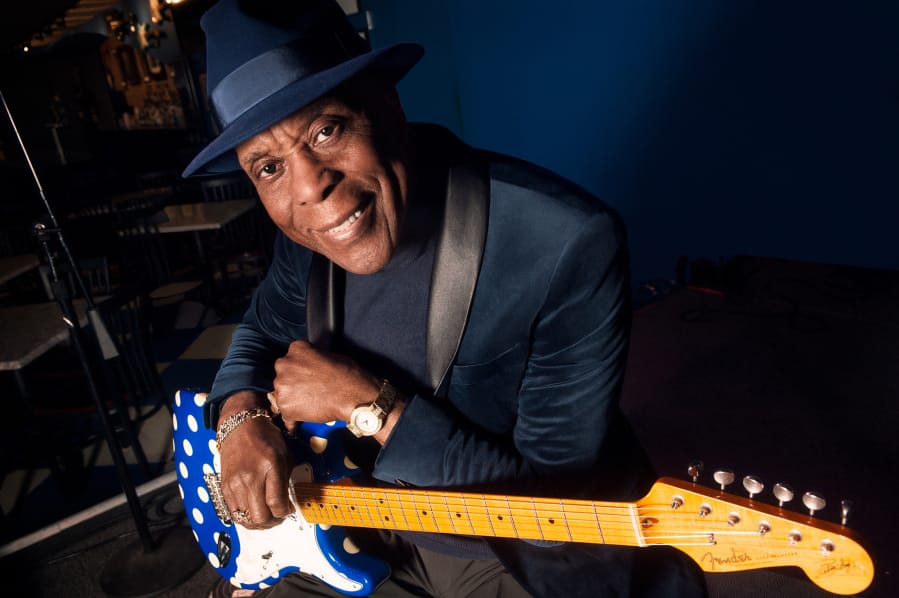CHICAGO — Buddy Guy is 83, and the number of blues shows he’s headlining this month at his South Loop club, Legends, is 16. That’s a lot, right?
“Well, I was born on a farm,” says the singer and guitarist who famously journeyed by train from his home in Lettsworth, La., to Chicago in 1957. “Every time I think I’m overworked, I think about the mule and the plow. We had to work from sunup to sundown. So that keeps me going.”
Guy’s work ethic has kept him afloat for six decades in the blues, to the point that Rolling Stone recently called him “the greatest living Chicago bluesman, and one of the most influential guitar players ever.” He has made dozens of albums, but they’ve never been much help financially. “I make my biggest money off touring,” he says. “I only missed one day since I’ve been a professional musician — I was supposed to go to Tokyo, and my doctor told me to cancel it. I went and made it up later.”
After six decades of struggling to be heard, first among a group of legendary bluesmen cutting heads at nightclubs on the South and West Sides, then in an industry where white guitarists earned far more money and fame than the African American pioneers who inspired them, Guy has achieved a sort of mythical status in recent years. After his mentor B.B. King died in 2015, the New Yorker’s David Remnick said Guy was “like one of those aging souls who find themselves the last fluent speaker of an obscure regional language.”
By phone from his Chicago home, though, he’s focused on more nuts-and-bolts issues. The Legends shows are coming up, which reminds him of the time in 1989 when he first opened the club in a barren, not-yet-developed part of town. “Around that corner was just ghetto,” he says. Guy had owned nightclubs in the past, including the famous Checkerboard Lounge on the South Side, but, he adds, “Blues clubs don’t make you rich — it makes you rich in the love of music but it don’t make you rich in money.”
Neighborhood celebrity
Although he does not pick his opening acts in January, from veteran guitarist Jimmy Johnson to 20-year-old Christone “Kingfish” Ingram, Guy is a fixture at the club, a neighborhood celebrity who poses nightly for tourist selfies at the bar and studies the performers.
“They can’t run me away no more, because the mayor said, ‘I want you to stay downtown,’ ” he says. “I was the first blues club to come that close downtown.”
Guy’s parents were Louisiana sharecroppers, near the Mississippi River, and he learned to play the guitar from visitors like a family friend named Henry “Coot” Smith” and John Lee Hooker records on jukeboxes. He was half a generation younger than the Mississippi Delta singers who journeyed to Chicago to invent the electric blues, so by the time he arrived in the late ’50s, Muddy Waters, Howlin’ Wolf and the rest were already established at the many local nightclubs.
“There’s a lot of blues guys who weren’t from the Delta, man,” he says. “I had to straighten them out about me when I come here.”
Guy was a talented young guitarist who could learn just about any song quickly and an underrated singer who could shriek like James Brown but knew how to put across an emotion with just a few quiet words. And unlike many of his contemporaries, notably the late guitarist Otis Rush, he was a showman who smiled relentlessly behind his signature polka-dotted Stratocaster. Chess Records, the South Side label home of Waters, Wolf, Little Walter and many others, hired him to perform on others’ records and occasionally put out tracks of his own, like 1960’s “First Time I Met the Blues.”
But Guy never was able to capture the wide-eyed improvisation he put across on stage, even on his best work, such as the late harpist Junior Wells’ 1965 classic “Hoodoo Man Blues” or his 1981 album “Stone Crazy!” Last year’s “The Blues Is Alive and Well” is an explosive album, full of typically fiery solos and soulful vocals, but Guy co-wrote only three of its 15 songs and didn’t contribute much to the production.
He’s starting work on the next album — all he’ll say about it is veteran R&B singer Bobby Rush makes an appearance — but seems disconnected from the process. “I’ve got to put my vocal on it in April or May, then I’ll know more about it,” he says.
For now, he’s focusing on the Legends shows and “hanging on there, trying to keep the blues alive.” Guy is happy SiriusXM has a channel devoted to the blues, unlike AM-FM radio, but he worries the service is too expensive for fans to discover the genre. “Nothing come free no more,” he says, then launches into a tangent about his greatest regret: “If I’d known you were going to buy drinking water, I would never have been a guitar player — I would’ve went to Vegas and put $500 down that one day you’re going to have to buy water. I would have been one of the richest guys in Vegas.”



